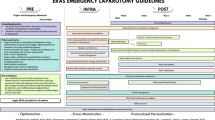Abstract
Background
Enhanced Recovery After Surgery (ERAS) is widely accepted in current surgical practice due to its positive impact on patient outcomes. The successful implementation of ERAS is challenging and compliance with protocols varies widely. Continual staff education is essential for successful ERAS programmes. Teaching modalities exist, but there remains no agreement regarding the optimal training curriculum or how its effectiveness is assessed. We aimed to draw consensus from an expert panel regarding the successful training and implementation of ERAS.
Methods
A modified Delphi technique was used; three rounds of questionnaires were sent to 58 selected international experts from 11 countries across multiple ERAS specialities and multidisciplinary teams (MDT) between January 2016 and February 2017. We interrogated opinion regarding four topics: (1) the components of a training curriculum and the structure of training courses; (2) the optimal framework for successful implementation and audit of ERAS including a guide for data collection; (3) a framework to assess the effectiveness of training; (4) criteria to define ERAS training centres of excellence.
Results
An ERAS training course must cover the evidence-based principles of ERAS with team-oriented training. Successful implementation requires strong leadership, an ERAS facilitator and an effective MDT. Effectiveness of training can be measured by improved compliance. A training centre of excellence should show a willingness to teach and demonstrable team working.
Conclusions
We propose an international expert consensus providing an ERAS training curriculum, a framework for successful implementation, methods for assessing effectiveness of training and a definition of ERAS training centres of excellence.












Similar content being viewed by others
References
Ren L, Zhu D, Wei Y et al (2012) Enhanced Recovery After Surgery (ERAS) program attenuates stress and accelerates recovery in patients after radical resection for colorectal cancer: a prospective randomized controlled trial. World J Surg 36(2):407–414. https://doi.org/10.1007/s00268-011-1348-4
Varadhan KK, Neal KR, Dejong CH, Fearon KC, Ljungqvist O, Lobo DN (2010) The enhanced recovery after surgery (ERAS) pathway for patients undergoing major elective open colorectal surgery: a meta-analysis of randomized controlled trials. Clin Nutr 29(4):434–440
Gustafsson UO, Hausel J, Thorell A et al (2011) Adherence to the enhanced recovery after surgery protocol and outcomes after colorectal cancer surgery. Arch Surg 146(5):571–577
Group EC (2015) The impact of enhanced recovery protocol compliance on elective colorectal cancer resection: results from an international registry. Ann Surg 261(6):1153–1159
Lv L, Shao YF, Zhou YB (2012) The enhanced recovery after surgery (ERAS) pathway for patients undergoing colorectal surgery: an update of meta-analysis of randomized controlled trials. Int J Colorectal Dis 27(12):1549–1554
Ljungqvist O, Scott M, Fearon KC (2017) Enhanced recovery after surgery: a review. JAMA Surg 152(3):292–298
Maessen J, Dejong CH, Hausel J et al (2007) A protocol is not enough to implement an enhanced recovery programme for colorectal resection. Br J Surg 94(2):224–231
Lyon A, Solomon MJ, Harrison JD (2014) A qualitative study assessing the barriers to implementation of enhanced recovery after surgery. World J Surg 38(6):1374–1380. https://doi.org/10.1007/s00268-013-2441-7
Smart NJ, White P, Allison AS, Ockrim JB, Kennedy RH, Francis NK (2012) Deviation and failure of enhanced recovery after surgery following laparoscopic colorectal surgery: early prediction model. Colorectal Dis 14(10):e727–e734
Keller DS, Delaney CP, Senagore AJ, Feldman LS, Force SST (2016) Uptake of enhanced recovery practices by SAGES members: a survey. Surg Endosc 31(9):3519–3526
Dalkey NC (1969) The Delphi method: An experimental study group of opinion. The RAND Corporation, Santa Monica
Williams PL, Webb C (1994) The Delphi technique: a methodological discussion. J Adv Nurs 19(1):180–186
Alahlafi A, Burge S (2005) What should undergraduate medical students know about psoriasis? Involving patients in curriculum development: modified Delphi technique. BMJ 330(7492):633–636
Gagliardi AR, Simunovic M, Langer B, Stern H, Brown AD (2005) Development of quality indicators for colorectal cancer surgery, using a 3-step modified Delphi approach. Can J Surg 48(6):441–452
Ferri CP, Prince M, Brayne C et al (2005) Global prevalence of dementia: a Delphi consensus study. Lancet 366(9503):2112–2117
Lassen K, Soop M, Nygren J et al (2009) Consensus review of optimal perioperative care in colorectal surgery: enhanced Recovery After Surgery (ERAS) Group recommendations. Arch Surg 144(10):961–969
Feldheiser A, Aziz O, Baldini G et al (2016) Enhanced Recovery After Surgery (ERAS) for gastrointestinal surgery, part 2: consensus statement for anaesthesia practice. Acta Anaesthesiol Scand 60(3):289–334
Scott MJ, Baldini G, Fearon KC et al (2015) Enhanced Recovery After Surgery (ERAS) for gastrointestinal surgery, part 1: pathophysiological considerations. Acta Anaesthesiol Scand 59(10):1212–1231
Knott A, Pathak S, McGrath JS et al (2012) Consensus views on implementation and measurement of enhanced recovery after surgery in England: Delphi study. BMJ Open 2(6):e001878
Acknowledgements
The authors are grateful to the experts who contributed to this project.
Author information
Authors and Affiliations
Corresponding author
Rights and permissions
About this article
Cite this article
Francis, N.K., Walker, T., Carter, F. et al. Consensus on Training and Implementation of Enhanced Recovery After Surgery: A Delphi Study. World J Surg 42, 1919–1928 (2018). https://doi.org/10.1007/s00268-017-4436-2
Published:
Issue Date:
DOI: https://doi.org/10.1007/s00268-017-4436-2



